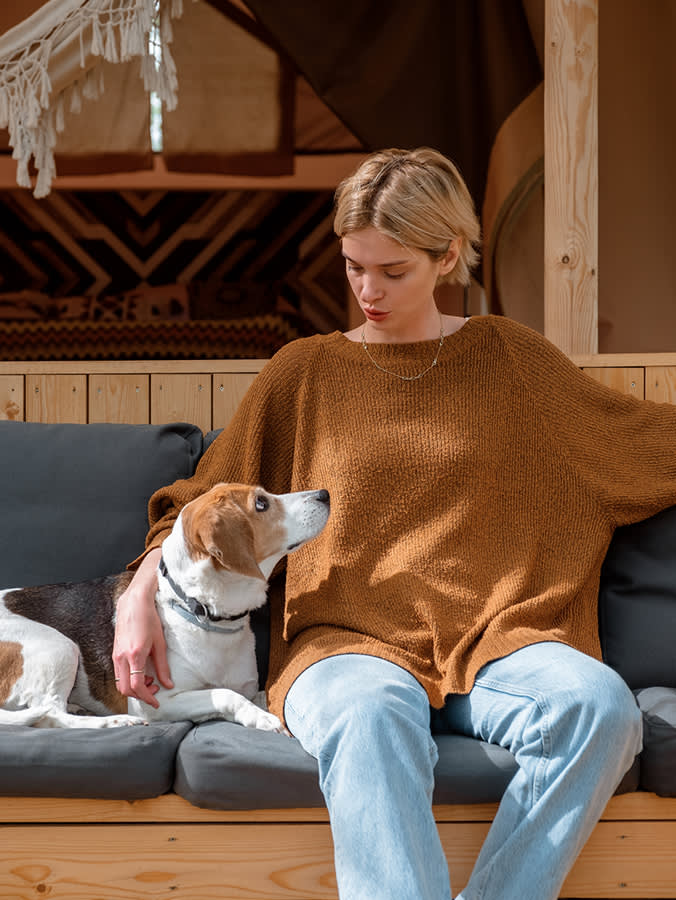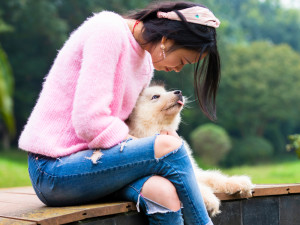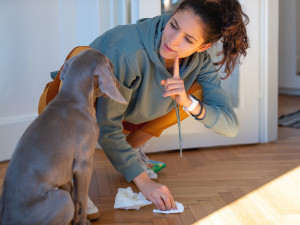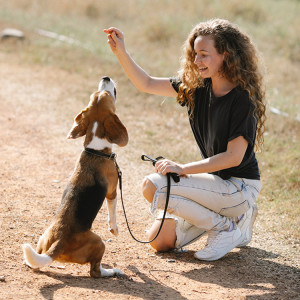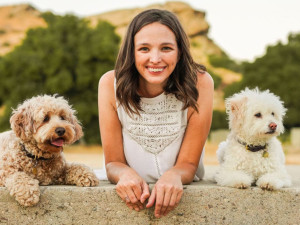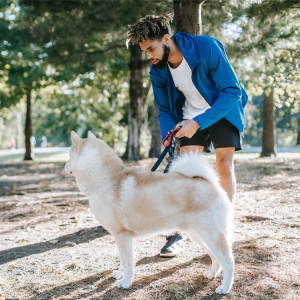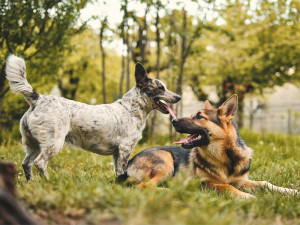How You Say Something to Your Dog Matters More Than What You Say
TikTok pet parents have made this clear: Tone matters. Celebrity dog trainer Nicole Ellis says dogs can hear “stress in our voice — whether directed at them or when they hear us talking to others.”
If you’re anything like me as a pet parent, you speak to your pet a lot. Honestly, I talk to my dog Rossi more than my boyfriend or my best friend.
All jokes aside, our dogs listen to how we speak more than we realize. From picking up on stress in our voice — whether directed at them or when they hear us talking to others — dogs hear this tone change. Sometimes, our pets will try to comfort us; other times, they’ll hear our stress and feel anxious. Think of the phrase “It’s not what you said — it’s how you said it.” You might pull that one out in, er, heated discussions with your S.O. from time to time, but it applies to pups, too. Here’s how.
Dogs understand more than you know.
Tone matters. Understanding this can help us become successful trainers and better pet parents. I use deliberate vocal tones when training. For example, my “Yesss” (accompanied by a clicker) to mark a behavior is very different from how I say, “Yes, I’d like fries with that.” My service dog clients learn “down” with a very specific (and unique) vocalization. And yes, our dogs are brilliant enough to pick up on this.
For example, this French Bulldog parent shared a TikTok videoopens in new tab of their pup sitting after they said any word they pronounced similarly to how they say “sit.” Why does the dog sit for these random commands?
How much do you spend on your pet per year?
First, “sit” might be a behavior that gets rewarded a lot. In my house, any dog that comes over gets rewards for sitting. Why? Because I love when dogs choose to sit instead of jumping on me, running out the door, tugging or chewing things. So a nice, patient “sit” gets rewarded a lot. It doesn’t take a dog very long to figure out that if they’re unsure what I’m asking, “sit” might be a good guess. And it might be a good guess that ends with a treat.
Second, dogs are aware of our vocal tone. if you say “chair” in the same tone in which you say “sit,” your dog may sit. It sounds enough like “sit” for them to make that same educated guess.
Will this happen for all dogs? Absolutely not.
“Hungry” is Rossi’s favorite word, it makes him spin, bark, and prance all over the house. I often ask him before dinner, “Are you…a hippo? Are you…hurting? Are you…” Well, you get the idea, until I finally say “hungry.” It’s become a fun game for us both as he waits eagerly for the right word to come out. My dogs know a lot of words, but they are trick dogs, movie dogsopens in new tab, and obviously my best friends. When I’m training a behavior they already know, they get a reward for doing the correct behavior the first time I ask. I always mix up the order in which I ask for behaviors, so they know they have to pay attention to what I’m saying.
On set, I can’t say “sit” 20 times for Rossi to sit, so the second I say it, he reacts. He listens intensely — after all, training is his favorite activity besides eating. By doing this, I have taught my dog to really listen. I also practice training in different tones. I may whisper “sit” — I may ask with just a hand cue or in a super excited voice. I do this so that no matter where we are, no matter how I need to ask him for a behavior, it’s not the first time I’ve said it like that.
Thinking about how we speak to our pets and when we reward them can improve our training, too. I often see pet parents ask a behavior two to five times before the dog performs it. This generally comes down to how the dog was taught, with someone saying “sit” over and over until Spot sits, and then Spot gets a cookie. If this is happening to you, say “sit,” be quiet, and wait. If your dog sits, throw him a party! If he doesn’t, go back to training the “sit“ and reward right away for success. Soon, your dog will sit the first time you ask.
It’s not always the positive tones — but sometimes the negative ones.
Our dogs don’t just pick up on the good stuff. They hear when we’re frustrated or angry. We never want them to associate these tones with training. This is the reason that no matter what mood I’m in, my recall “come” sounds happy and excited. Would my dog like to leave those stinky leaves he’s rolling in to run back to an angry person? Probably not. So, I set him up for success by always using a positive tone and rewarding when he comes back to me.
Another example of tone making the difference: This Pit Bull parentopens in new tab on TikTok says, “You’re a good girl” to their Pittie using a harsh tone — and she gets upset. When they ask, “Who’s a naughty girl?” in a sweet, excited tone, she gets happy and asks for praise.
I also know a few dogs whose names sound familiar to other common words. A dog named Juno I know doesn’t always respond to her name, but her name can sound like “no,” especially when her owner is frustrated. Juno’s not being bad; she’s just hearing the “no” sometimes. That might make you think twice about what you name your pup.
